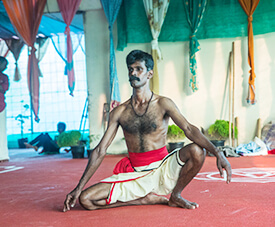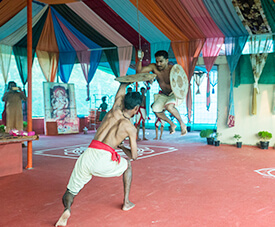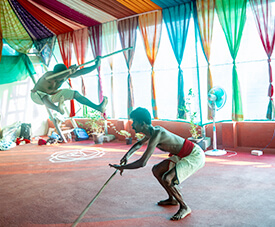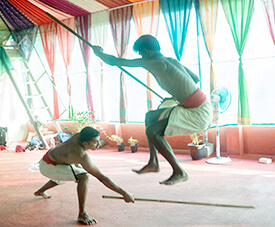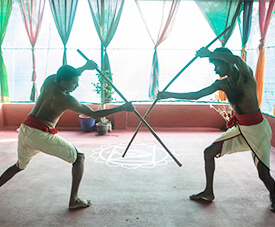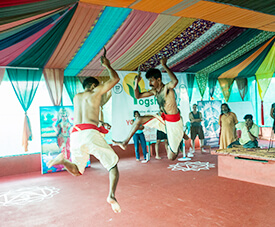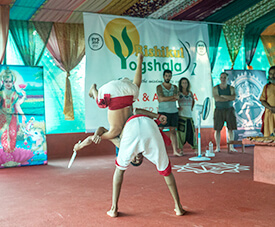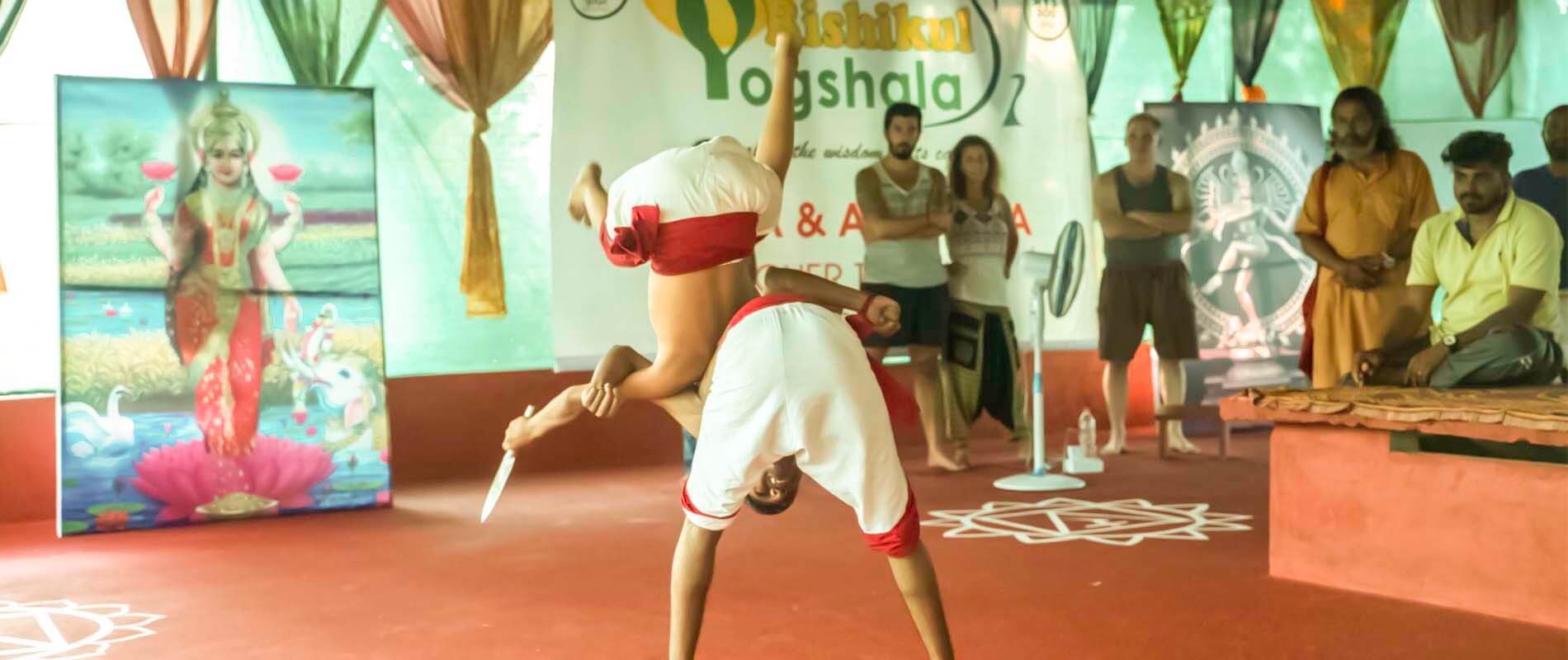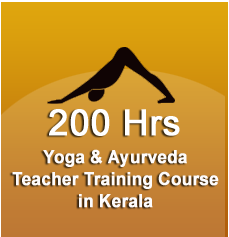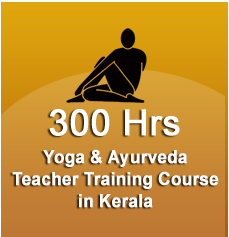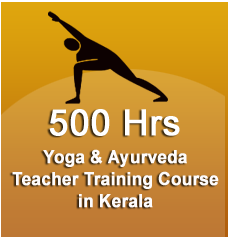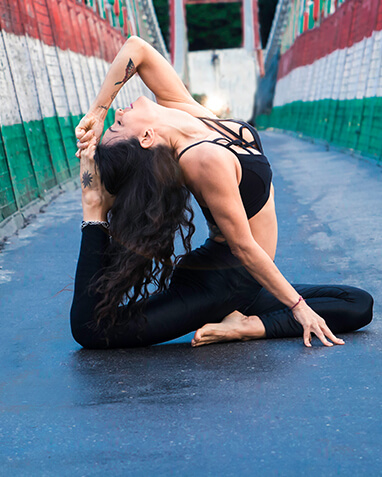
- Discover and learn the ancient Indian martial art form of kalaripayattu and also embark on a soul-searching journey with our Kalaripayattu and Yoga Teacher Training in India. It is a once in a lifetime opportunity to delve deeper into these practices at the same time and that too, in their birthplace, India. Enhance your physical and mental prowess under the guidance of expert teachers and evolve yourself into a new
Kalaripayattu and Yoga Teacher Training in Kerala

Like all other things in India, its art too, are intricately linked with religiosity and spiritualism. The foundation of Kalaripayattu, a martial art which originated in the South India, is attributed to Agstya Muni—the legendary saint of the ancient ages. This martial skill is not merely about doing the impressive movements but about achieving a state of consistent agility and reflexes. It is an invasive discipline, meaning to deepen the presence of mind, which in turn will facilitate fast and fluid physical movement.
One of the oldest military combat systems in existence, Kalaripayattu has evolved over the years in many ways. Just like Yoga, the essence of Kalari is preserved only in the Indian tradition. Our institute, being based in Kerala—the birth land of this exceptional art form, has access to the greatest masters of the game.
Get a comprehensive coverage of the various forms of Kalari, varying in styles and postures through our course and an in-depth understanding of the primary approach to mindfulness in all the different styles.
KALARIPAYATTU AND YOGA
Like yoga, the main objective of Kalari is to elevate the body and being to a higher state of consciousness, opening up the unexplored potentials of an individual and thus moving towards the spiritual goal of becoming one with The Eternal. The way Yoga wisdom is strengthened through the practice of yogasanas or postures at physical level and by stabilizing the mind through meditation, Kalaripayattu builds reflexes and mindfulness by activating the instinct. Inspired by animal sensitivity, Kalari incorporates several postures representing specific animal traits, like
Aggressiveness of the wild boar,
Serpentine litheness,
Majestic strength of the lion
Wakefulness of the rooster, and much more.
The two-fold practice of yoga asana and Kalaripayattu postures will sharpen your physical skills of coping with adverse situations and the necessary psychological disposition for the same.

SPECIFIC SKILLS AND STRATEGIES
Kalaripayattu relies on pre-choreographed sequences of postures meant as exercise for fitness, playful acrobatics, and defensive combat. Some of the aspects of Kalari are as follows:
- Meipayattu: This is meant for activating the body through vigorous movement of legs, hips, hands and torso.
- Marichilukal: An acrobatic regimen, this aspect of Kalari focuses on instinctive moves for self defense. Bare-handed attacks and weapon-based attacks are both part of this regimen.
- Kaikuththippayattu: This strategy of Kalari involves disciplining of the breath to bring stability in action and preservation of power. As in yoga, regularization of breath plays a major role in Kalaripayattu.
- Chuvattadi: This refers to stances on a defensive level, blocking attacks from all four sides at once.
- Kaithada: Blocking, dodging, and manipulating the opponent’s stances are comprised in this valuable aspect of Kalari.


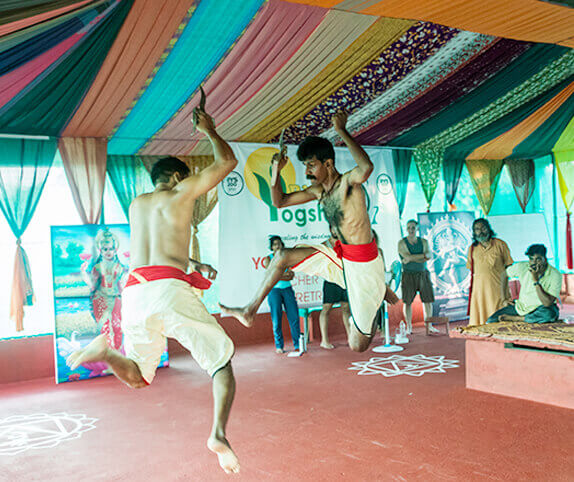
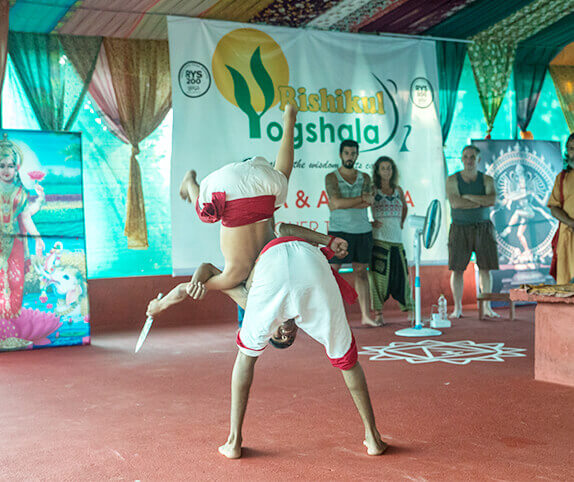

A PERFORMANCE FORM OF GREAT STAMINA INVOLVING WEAPONRY
Kalariyapattu as a performance form also relates to the classical dance forms like Teyyam which originated in ancient India which portrays mythological tales of bravery of legendary heroes and heroines. All these related forms of performance calls for great physical stamina. Therefore, developing a combative mindset and knowledge of weapon usage will be part of your Kalariyapattu training. The legendary Parashurama- the slayer of enemies is considered the master of this aspect of combative training with weapons in Kalariyapattu. During your Kalari training in Kerala, you can learn the interesting combative usage of
- Venmazhu or axe
- Ponti or small club
- Thotti or hook spear
- Thuvala or towl/ long sash of cloth
Other Location
PHOTO GALLERY
